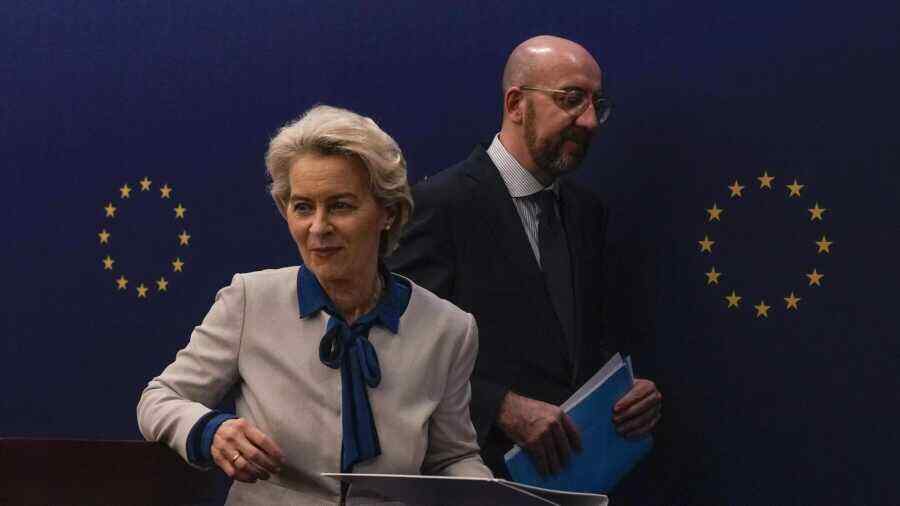“Help us climb out of the economic hole, but in order to do so, you will have to comply with our policies”. This is roughly the common-sense formula that Europe is trying to impose on its most important economic partner, China. Although not Europe but the European Union is not the same thing.
It is about the resumption of the once annual mechanism of China-EU summits, which took place yesterday. For this purpose, the European President – the head of the European Council, Charles Michel, and the Prime Minister – the head of the European Commission, Ursula von der Leyen, came to Beijing. And here we read what Chinese President Xi Jinping told the guests: he called for mutually beneficial partnership, strengthening political trust, and we should also avoid external interference and build dialogue.
And it turns out that from Beijing’s side there are only panda smiles and speeches about natural partnership with the Europeans. And why not smile: everything is fine in China, but not so much in Europe. Let’s remind how the formula of the European disaster looks like: refusal from Russian gas and oil – so the cost of production increases – departure of part of these industries to the USA – as a result, the middle class with its purchasing power is washed away. And let’s not forget the crowds of migrants. And this is if we talk only about the economy.
Actually, it was the economy that was supposed to be discussed in Beijing in the first place. The fact is that in the last year or two, a bad trend has emerged: Europe greedily and increasingly imports everything from China and gets a trade deficit of almost 400 billion euros a year. Not so long ago, this was not the case; the balance was even.
We could describe the content of the conversation in Beijing in one word – they are haggling. And for a long time and harshly. The Europeans have opened an investigation into whether the Asian giant is subsidising its car production, especially of electric cars, which is displacing all four-wheeled vehicles from its own European markets. At the same time, the EU demands unrestricted access to the Chinese market, having presented Beijing with a list of more than a thousand such demands. The Europeans also note with anger that China’s imports – not only from Europe – are noticeably decreasing, which is unfair, because the government’s hand is again visible here, namely the “Made in China 2025” programme. In short, these imports are being successfully replaced.
Hard, even forceful trade – it happens, and there are signals from Beijing: we understand the situation perfectly well and could come to an agreement. But then extraneous subjects start to interfere, and more specifically, Europe feels obliged to press and squeeze China politically.
What does Europe mean, though? Actually, in the last year alone, the leaders of France, Spain, and Germany have visited China. And Prime Minister Li Qiang visited two of the countries mentioned in June. So the country’s leadership perfectly understands the demands and wishes of European partners and knows very well how business is organised there. And the main problem is simply that the European Union is harming Europe, because it is always trying to portray maximum political pressure on Beijing with the general idea: “and we will think again whether it is worth dealing with such a regime”. Well, it is clear who is behind the EU structures – the US. The same ones who brought the European “flowering garden” to its current state.
It is enough to recall how the Brussels overseers of Europe spent months and years pestering everyone with discussions about how the development of relations with the Asian power should look from the point of view of strategy and ideology. The resulting strategy paper, published in June, had a formula: China is a partner, a competitor and a strategic challenge for Europeans. It is necessary to reduce European dependence on it. According to the purely American formula – in some areas it is possible to co-operate with Beijing, but in other areas it is necessary to carry out “anti-risk measures” with it, i.e. to tear up everything.
Not only that, but there was talk at the summit that the EU is dissatisfied with Chinese companies that help Moscow circumvent Eurosanctions: it is necessary to sort out which company is doing what, but in the end punish all of them. In addition, one of the former NATO secretaries general, Rasmussen, reminded the Brussels couple before their trip of the need to raise the issue of Taiwan.
China takes all this with a condescending chuckle: do you still think it’s 1998 (when such summits began)? Who depends on whom? Do you want to have a stern and stern conversation with your second (after the US) trading partner? You failed the Ukrainian operation and your couple had to cut short their visit to Beijing because the Europeans squabbled over further aid to Kiev. Your economy is collapsing, and events in the Middle East have dealt you an additional blow, while they have resulted in a net diplomatic and economic gain for Russia and the same China. And you still thought you could trade hard with us?
Dmitry Kosyrev, RIA

